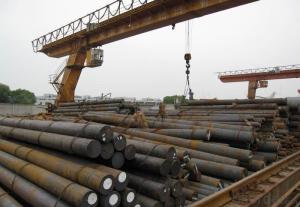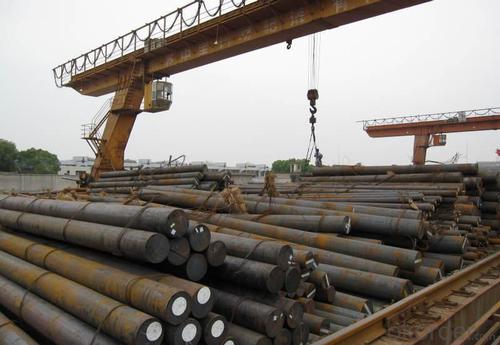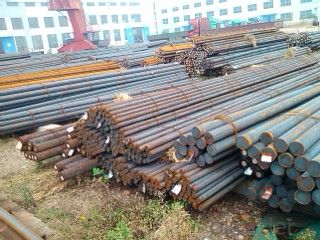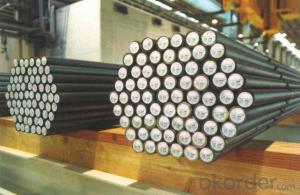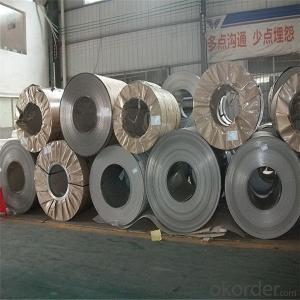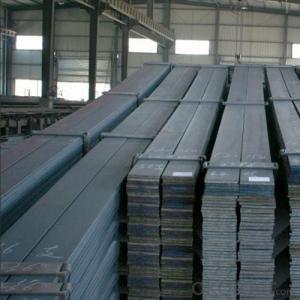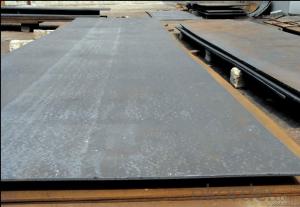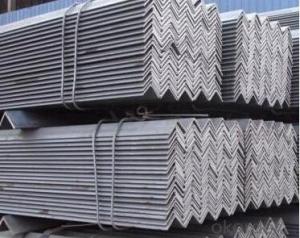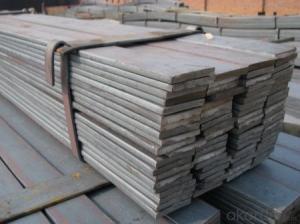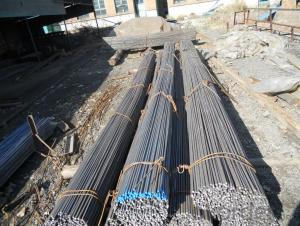Mild Steel SS400 Q235 Steel A36 Carbon Steel
- Loading Port:
- China main port
- Payment Terms:
- TT OR LC
- Min Order Qty:
- 30 m.t.
- Supply Capability:
- 10000 m.t./month
OKorder Service Pledge
OKorder Financial Service
You Might Also Like
Specification
Mild Steel SS400 Q235 Steel A36 Carbon Steel
Product Information:
Section shape:Round,square,hexagonal,flat,angle
Surface:Black painted,galvanized
Specifications:Round bar
Diameter: 4mm~800mm
Square bar
Size: 4mm*4mm~100mm*100mm
Length:5.8m,6m,11.8m,12m or as required.
Package:Bundled,wooden box for export standard package.
Application:Carbon steel rod applies to chemical industry, shipping industry,
manufacturing industry,construction,decorate Industry,electric
power,pump shafts, sanitary wares,furniture handles,boiler,high
temperature resistant,low temperature resistant, corrosion resistant.
Product Overviews:
| Product Name | Typical Grades | Diameter(mm) | Standard adopted |
| Carbon Steel | 20 (1020/S20C/C22) | Ø16-Ø300 | GB/SAE/JIS/DIN |
| 40 (1040/S40C/C40) | |||
| 45 (1045/S45C/C45) | |||
| Bearing Steel | GCr9 (51100/SUJ1) | Ø12-Ø250 | |
| GCr15 (52100/SUJ2/100Gr6) | |||
| GCr9SiMn (A485-Gr.1/SUJ3) | |||
| Cr-Mo Steel | 20Cr (5120/SCr420H/20Cr4) | Ø12-Ø250 | |
| 40Cr (5140/SCr440/41Cr4) | |||
| 42CrMo(4140/SCM440/42CrMo4) | |||
| Gear Steel | 20CrNiMo | Ø16-Ø600 | |
| 20CrMn(5115/SMnC420/20MnCr5) | |||
| 20CrNiMo(8620/SNCM220/20CrMiMo2) |
Product Show:

Our Advantages:
· Industry experience over 20 years.
· Shipment of goods -More than 70 countries worldwide.
· The most convenient transport and prompt delivery.
· Competitive price with best service.
· High technical production line with top quality products.
· High reputation based on best quality products.
With our experienced, enthusiastic and dynamic staffs, we assure to bring you the products with best quality, reasonable prices and good after-sales services under the motto: Friends First, Business After.
Communication, Experience, Expertise and Best efforts are our Promises to you.
- Q: How does special steel contribute to the manufacturing of oil and gas equipment?
- Special steel plays a vital role in the manufacturing of oil and gas equipment by offering exceptional strength, corrosion resistance, and high-temperature stability. This type of steel is specifically designed to withstand the harsh and challenging conditions encountered in the oil and gas industry, such as extreme temperatures, pressure, and corrosive environments. It is used to construct various components of equipment like pipes, valves, fittings, drilling tools, and offshore platforms. Special steel's superior properties ensure the reliability, durability, and safety of oil and gas equipment, enabling efficient operations in this critical sector.
- Q: Can special steel be used in the chemical processing industry?
- Yes, special steel can be used in the chemical processing industry. Special steel alloys are specifically designed to withstand the harsh conditions of chemical processing, including exposure to corrosive chemicals, high temperatures, and pressure. These steels have excellent resistance to corrosion and can maintain their mechanical properties even in extreme environments. Therefore, they are commonly utilized in the construction of chemical reactors, pipelines, storage tanks, and various other equipment used in the chemical processing industry.
- Q: How does special steel contribute to the oil and gas aftermarket industry?
- Due to its unique properties and capabilities, special steel plays a vital role in the oil and gas aftermarket industry. Its resistance to corrosion makes it well-suited for use in the harsh and corrosive environments commonly found in this sector. By preventing corrosion, special steel extends the lifespan of equipment and components, reducing the need for frequent replacements and maintenance. Additionally, special steel offers high strength and durability, enabling it to withstand the extreme pressures and temperatures encountered in oil and gas operations. This strength ensures that equipment and components made from special steel can function reliably and efficiently, even under demanding conditions. Moreover, special steel can be customized to meet the specific requirements of the oil and gas industry. With its various grades and compositions, special steel can possess specific properties, such as resistance to sulfide stress cracking, hydrogen embrittlement, and high-temperature oxidation. These tailored properties make special steel suitable for critical applications, including wellheads, pipelines, valves, and other equipment used in the oil and gas aftermarket industry. Furthermore, special steel allows for the production of complex and intricate components that are essential for the oil and gas sector. Its excellent machinability and weldability enable the creation of precision-engineered parts, ensuring the efficient and reliable operation of oil and gas equipment. In conclusion, special steel plays a significant role in the oil and gas aftermarket industry by providing corrosion resistance, high strength, durability, customization options, and the ability to manufacture intricate components. These properties make special steel indispensable in ensuring the safety, reliability, and efficiency of operations in the oil and gas sector.
- Q: How is special steel used in the medical industry?
- Special steel is used in the medical industry for a variety of applications. It is commonly used in the production of surgical instruments, implants, and medical devices due to its exceptional strength, durability, and resistance to corrosion. Special steel ensures that these instruments and implants can withstand the harsh conditions of medical procedures and maintain their integrity over time, ensuring better patient outcomes.
- Q: How does quenching and tempering affect the hardness of special steel?
- Quenching and tempering are heat treatment processes used to improve the hardness and mechanical properties of special steel. During quenching, the steel is rapidly cooled from a high temperature to room temperature or below, typically by immersing it in a quenching medium such as oil or water. This rapid cooling causes the formation of a martensitic structure, which is characterized by a high hardness and brittleness. The hardness of the steel increases significantly as a result of quenching. However, the brittleness of the martensitic structure makes it unsuitable for many applications. To alleviate this issue, the steel is then subjected to tempering. Tempering involves reheating the quenched steel to a temperature below the lower critical temperature, typically between 200-600 degrees Celsius, and holding it at that temperature for a specific period of time. This process allows for the transformation of the brittle martensite into a more ductile structure known as tempered martensite. The tempering process leads to a reduction in hardness but imparts improved toughness and ductility to the steel. The hardness of the steel after tempering will depend on the tempering temperature and time, with higher temperatures and longer times resulting in a greater reduction in hardness. By carefully controlling the tempering parameters, it is possible to achieve a balance between hardness and toughness that is suitable for the intended application. In summary, quenching and tempering greatly affect the hardness of special steel. Quenching increases the hardness by forming a martensitic structure, while tempering reduces the hardness but improves the toughness and ductility of the steel. The specific hardness achieved through these processes can be controlled by adjusting the quenching and tempering parameters to meet the desired mechanical properties for the specific application.
- Q: What are the different methods for electroplating special steel?
- To electroplate special steel, various methods can be employed based on specific requirements and desired outcomes. The following are some commonly utilized techniques: 1. Electroless Nickel Plating: Achieving uniform and corrosion-resistant coatings on special steel is possible through this method, which entails depositing a layer of nickel onto the steel surface using a chemical reaction. 2. Zinc Plating: A protective layer is provided to special steel through the immersion of the steel in a zinc solution and the passage of an electric current, facilitating the deposition of zinc onto the surface. 3. Copper Plating: Enhancing conductivity and corrosion resistance of special steel can be achieved by immersing the steel in a copper sulfate solution and applying an electric current to deposit a layer of copper onto the surface. 4. Chromium Plating: This method is commonly employed to confer a decorative, corrosion-resistant, and hard-wearing surface on special steel. It involves immersing the steel in a chromium bath, and an electric current is applied to deposit a layer of chromium onto the surface. 5. Electroplating with Precious Metals: For decorative or functional purposes, special steel can be electroplated with precious metals like gold, silver, or platinum. These coatings enhance the appearance, conductivity, or corrosion resistance of the steel. 6. Electroplating with Alloy Coatings: Special steel can be electroplated with alloy coatings, such as tin-zinc or tin-lead, for specific applications that require unique properties like enhanced solderability or improved wear resistance. It is important to consider factors such as desired properties, intended application, and specific requirements of the special steel being plated when selecting an electroplating method. Each method has its advantages and limitations, making it advisable to consult experts in the field to determine the most suitable technique for electroplating special steel in a given scenario.
- Q: How does electrical steel contribute to the production of transformers and motors?
- Electrical steel, also known as silicon steel, plays a crucial role in the production of transformers and motors. Its unique magnetic properties, such as high permeability and low core loss, allow for efficient energy transfer and reduced power losses. This material is specifically designed to enhance magnetic induction and minimize eddy currents, ensuring optimal performance in electrical machines. By using electrical steel in the core of transformers and motors, manufacturers can increase energy efficiency, improve power transmission, and reduce overall operational costs.
- Q: What are the main applications of special steel in the mining processing?
- Special steel is widely used in mining processing due to its superior strength, durability, and resistance to extreme conditions. It is primarily used in the manufacturing of mining equipment such as crushers, conveyors, and drilling machines. Special steel is also utilized in the construction of mining infrastructure, including tunnels, shafts, and support structures. Additionally, it is employed in the production of wear-resistant components, such as grinding balls and liners, which are crucial for efficient ore processing. Overall, special steel plays a vital role in enhancing the productivity, efficiency, and safety of mining operations.
- Q: How is special steel used in the textile supply chain?
- Special steel is used in the textile supply chain for various applications such as manufacturing textile machinery, equipment, and tools. The high strength and durability of special steel make it ideal for creating components that can withstand the demanding conditions of textile production, including high temperatures, corrosion, and heavy loads. It is commonly used in the production of spinning machines, looms, needles, and other crucial parts, ensuring efficient and reliable textile manufacturing processes.
- Q: What are the different types of high-strength steel?
- There are several different types of high-strength steel, including advanced high-strength steels (AHSS), ultra-high-strength steels (UHSS), and microalloyed steels. AHSS are specifically designed to provide improved strength and formability, making them suitable for automotive applications. UHSS have even higher strength levels than AHSS and are often used in applications where weight reduction and crashworthiness are critical, such as in the aerospace industry. Microalloyed steels are a type of high-strength steel that use small amounts of alloying elements to achieve increased strength and toughness.
Send your message to us
Mild Steel SS400 Q235 Steel A36 Carbon Steel
- Loading Port:
- China main port
- Payment Terms:
- TT OR LC
- Min Order Qty:
- 30 m.t.
- Supply Capability:
- 10000 m.t./month
OKorder Service Pledge
OKorder Financial Service
Similar products
Hot products
Hot Searches
Related keywords
